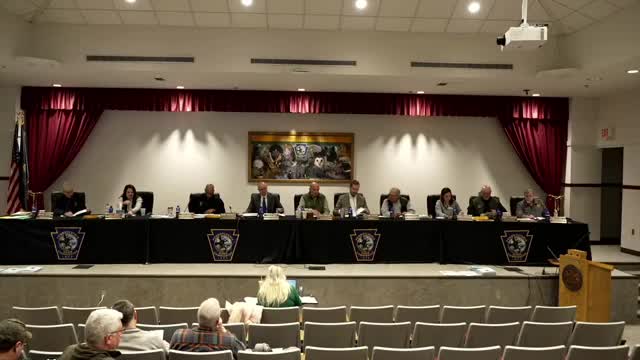Game Commission adopts 2025–26 seasons, narrows farm tag start date after debate
Get AI-powered insights, summaries, and transcripts
Subscribe
Summary
The Game Commission approved the 2025–26 seasons and bag limits package, including a three-hare limit for snowshoe hares, removal of a proposed special archery hunt at Middle Creek, and an amendment moving the agricultural (ag) tag start from July 1 to August 1 after commissioners debated potential impacts on fawns.
The Game Commission voted to adopt its proposed seasons and bag limits for the 2025–26 license year, approving a package that includes a new three-hare limit for snowshoe hares, the removal of a proposed special archery hunt at Middle Creek Wildlife Management Area and an amendment moving the agricultural (ag) tag season start date from July 1 to Aug. 1 while keeping the April 15 end date.
The change to snowshoe hare limits, proposed by staff and adopted by the commission, sets a maximum of three hares per hunter. According to the staff presentation, the limit is intended to reduce the risk of localized overharvest by replacing a looser field-possession approach with an explicit season limit per hunter.
Commissioners removed language authorizing a one-day archery/flintlock managed hunt at Middle Creek after staff told the panel that the regular season would suffice and the special season was unnecessary. The removal was made by amendment and carried on a voice vote.
The most discussed change was to the ag tag season. Staff had proposed a July 1 start through April 15, 2026. Commissioner Koppenhaver moved to restore the program’s traditional Aug. 1 start; that amendment (to move the start date to Aug. 1 while retaining the April 15 end) won on a voice vote after several commissioners raised biological concerns about fawning. One commissioner urged Aug. 15 as a more precautionary start, citing a June 1 peak in fawn birth and roughly 10 weeks to weaning, but the commission approved Aug. 1.
The commission approved the full seasons-and-bag-limits package as amended in a subsequent voice vote.
What the commission said and why it matters: commissioners and staff repeatedly framed the package as a mix of science-based adjustments and stakeholder input. Staff told the commission the hare limit and other changes reflect “current available scientific data, population and harvest records, field surveys and professional staff observations,” and that the ag-tag expansion was designed to provide more days that hunters could legally use ag tags to reduce crop depredation.
Votes and procedure: the meeting record shows multiple page-by-page reviews of the draft regulatory text. Several specific amendments were moved, seconded and carried by voice vote; the full, amended package was then adopted by voice vote.
Background: commissioners said they received input from sporting groups, the agricultural community and other stakeholders while drafting the rule changes. Staff noted the previously established Middle Creek special-season language had been put in place by executive order in past years but is no longer necessary, according to staff comments during the meeting.
Next steps: the rulemaking will proceed consistent with the amendments adopted at the meeting; staff will incorporate the strike of the Middle Creek language and the Aug. 1 ag-tag start into the final regulatory text to be published in the next steps of the rulemaking process.
